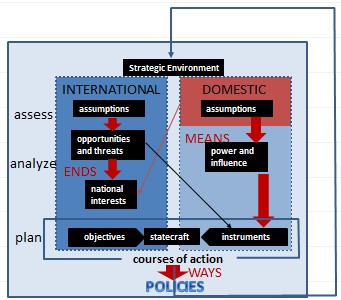Terrorism Threat in Doctrine Formulating of Military Campaign Scenario to Achieve National Security
On Estimative Methodology Review
Abstract
Based on the estimation methodology on the potential of the war against terrorism on the transformation of doctrine, the conclusions based on the predictive analysis are: (1) The potential for the war against terrorism has a very strong relevance to the prediction of changes in military campaign doctrine in the long term by producing new war strategies both in terms of ends-means-ways as a result of High Impact Low Probability, (2) Through predictive analysis with extrapolation model, it is found that threats, strategic environment and tradition or history are variables that are expected to remain unchanged, especially in the short term in influencing the preparation of Military Campaign Doctrine, (3) The Projection Model determines if Threat is the variable that changes the most so that it will affect changes in the Military Campaign Doctrine in the short to medium term, (4) Looking for the best solution in realizing the best Military Campaign Doctrine. This can be followed by designing a simulation of the New War Strategy as a result of forecasting the Military Campaign Doctrine.
References
Clark, R. M. (2019). Intelligence Analysis, A-Target Centric Approach, CQ Press.
Deibel, Terry L (2014). Foreign Affairs Strategy Logic for American Statecraft, Cambridge University Press
Hart, G. (2012). The Five Ws of Online Help, TECHWR-L.
Kementerian, P. R. I. (2015). Peraturan Menteri Pertahanan No.19 Tahun 2015 Tentang Kebijakan Penyelenggaraan Pertahanan Negara Tahun 2015-2019.
Lykke, Jr. A. F. (1998). Military Strategy: Theory and Application Carlisle, PA: U.S. Army War College.
Mazzar, M. (2019). Vikhrant Desphande. Hybrid Warfare: The Changing Character of Conflict, Institute for Defense Studies amd Analysis (IDSA).
Tulak, A. N. (2021). Perang Terorisme, Tantangan Baru dalam Lingkungan Informasi. Retrieved 22 April 2021, from https://ipdefenseforum.com
Walter, N. A. (1998) . Doktrin Gabungan AS, JP 3-0, Operasi Gabungan, US Army.


This work is licensed under a Creative Commons Attribution 4.0 International License.
Copyright for this article is retained by the author(s), with first publication rights granted to the journal.
This is an open-access article distributed under the terms and conditions of the Creative Commons Attribution license (http://creativecommons.org/licenses/by/4.0/).









1.png)














